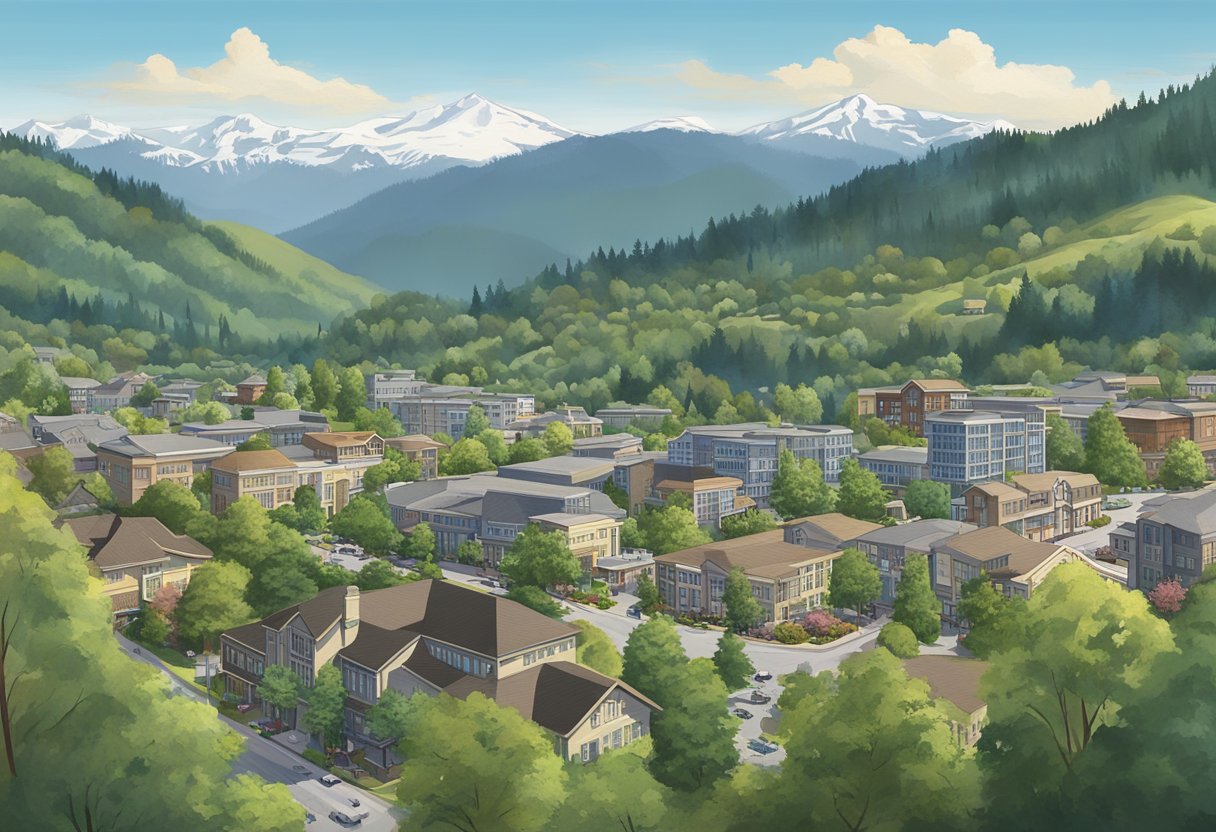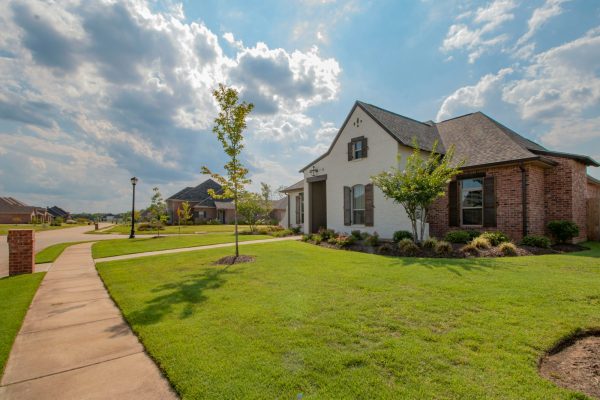The real estate market in Issaquah, Washington has been experiencing steady growth over the past few years. With its beautiful scenery and proximity to Seattle, Issaquah has become an attractive location for people looking to buy a home. In this article, we will take a closer look at the current state of the real estate market in Issaquah and provide a forecast for the future.

According to recent data, the median sale price of a home in Issaquah was $1.0M last month, up 7.2% since last year. The median sale price per square foot in Issaquah is $557, up 9.3% since last year. The Issaquah real estate market had 106 homes for sale in January 2024, a 10.4% increase compared to December 2023. Single-family homes make up the slight majority of houses currently on the market.
With the increase in home prices and demand, it is important to understand the factors that are contributing to the growth of the real estate market in Issaquah. This article will explore the economic and demographic trends that are driving the market and provide insights into what the future may hold for those looking to buy or sell a home in Issaquah.
Market Overview

Current Real Estate Climate
The real estate market in Issaquah, Washington is currently very competitive. Homes receive an average of 2 offers and sell in around 25 days. The median sale price of a home in Issaquah was $1.0M last month, up 7.2% since last year. The median sale price per square foot in Issaquah is $557, up 9.3% since last year. The median listing home price in Issaquah, WA was $900K in December 2023, trending down -9.2% year-over-year.
Historical Market Trends
Real estate market trends in Issaquah, Washington reflect that there have been 638 transactions over the past year. The market in this region is exhibiting a more pronounced downturn. Bremerton forecasts a substantial decrease in housing prices, with a -1.3% growth rate by February 29, 2024, following a -0.3% decrease by November 30, 2023.
The above table shows the median estimated value of homes in Issaquah, WA by zip code. As per the data, the median estimated value of homes in zip code 98029 is $529,098 and the median estimated value of homes in zip code 98027 is $1,537,444. The median price per square foot for homes in zip code 98029 is $443, while the median price per square foot for homes in zip code 98027 is $498.
Overall, the real estate market in Issaquah, Washington is exhibiting a challenging landscape, with a more pronounced downturn in some regions. However, the median sale price of homes in Issaquah has increased since last year, which may indicate a positive trend in the future.
Economic Factors

Employment Rates
The employment rate is a crucial factor in determining the real estate forecast for Issaquah, Washington. According to the latest data, the unemployment rate in Issaquah is 3.2%, which is lower than the national average of 3.9%. This indicates that the job market in Issaquah is stable, which is a positive sign for the real estate market. With more people employed, there is a higher demand for housing, which can drive up home prices.
Interest Rates
Interest rates are another important factor that can impact the real estate market in Issaquah. Currently, interest rates are low, which means that borrowing money is more affordable. This can encourage more people to buy homes, which can lead to an increase in demand and prices. However, if interest rates were to rise, this could potentially slow down the real estate market as it would become more expensive to borrow money.
Local Economy
The local economy in Issaquah is diverse and growing. The city is home to several major employers, including Costco, Microsoft, and Siemens. In addition, there are many small businesses and startups in the area. This diverse economy helps to make Issaquah a desirable place to live and work, which can lead to an increase in demand for housing. The city’s strong economy also helps to support the real estate market by providing stability and growth potential.
Overall, with a stable job market, low interest rates, and a diverse and growing local economy, Issaquah’s real estate market is poised for continued growth and stability.
Housing Demand
Population Growth
Issaquah is a city located in King County, Washington, with a population of approximately 41,000 people as of the last census in 2020. The city has experienced steady population growth over the past few years, with estimates showing a 1.2% increase in population from 2020 to 2021. This growth is expected to continue, with the city projected to have a population of over 50,000 by 2040.
The population growth in Issaquah is driven by a combination of factors, including its proximity to major employment centers in the Seattle metropolitan area, a strong local economy, and a desirable quality of life. As more people move to the city, the demand for housing is likely to increase, putting upward pressure on prices.
Housing Supply Constraints
Despite the growing demand for housing in Issaquah, the city has faced significant supply constraints in recent years. The city has limited land available for development, and much of the land that is available is subject to strict zoning regulations. Additionally, the cost of construction has risen sharply in recent years, making it difficult for developers to build new housing units at affordable prices.
These supply constraints have resulted in a tight housing market, with limited inventory and high prices. As a result, many potential homebuyers have been priced out of the market, and the city has struggled to meet the demand for affordable housing. While there are some new developments in the pipeline, it remains to be seen whether they will be enough to meet the growing demand for housing in the city.
Price Projections
Short-Term Forecasts
According to recent data, the Issaquah real estate market is expected to remain competitive in the short term. Homes in Issaquah receive an average of two offers and sell in around 25 days. The median sale price of a home in Issaquah was $1.0M last month, up 7.2% since last year. The median sale price per square foot in Issaquah is $557, up 9.3% since last year.
Long-Term Outlook
Looking ahead, the Issaquah real estate market is expected to experience a gradual increase in housing prices. The National Association of Realtors predicts that home prices in the United States will rebound by 1.8% to $390,000 by year-end 2024. By 2025 through 2028, given the large run-up from 2021 through 2023, home prices are predicted to rise more gradually at about a percentage point above.
Based on the Issaquah housing market report from January 2024, the median sold price of homes in Issaquah, WA is $987,066, with a price per square foot of $517. The report also shows that the Issaquah real estate market had 106 homes for sale in January 2024, a 10.4% increase compared to December 2023.
In summary, the Issaquah real estate market is expected to remain competitive in the short term, with gradual increases in housing prices in the long term. These projections should be taken into account when considering buying or selling a home in Issaquah, WA.
Investment Potential
Rental Market Trends
Issaquah’s rental market is expected to continue growing in the coming years. According to RocketHomes, the average rent for a 1-bedroom apartment in Issaquah was $1,800 in January 2024, a 3.4% increase compared to the previous year. The average rent for a 2-bedroom apartment was $2,300, a 4.5% increase compared to the previous year.
Issaquah’s rental market is driven by the city’s strong economy, high quality of life, and proximity to Seattle. The city’s population is expected to continue growing, with many new residents choosing to rent rather than buy.
Property Investment Returns
Issaquah’s real estate market offers strong potential for property investors. According to Redfin, the median sale price of a home in Issaquah was $1.0M in February 2024, up 7.2% since the previous year. The median sale price per square foot in Issaquah is $557, up 9.3% since the previous year.
Investors who purchase properties in Issaquah can expect to enjoy strong appreciation in property values over time. Additionally, the city’s strong rental market means that investors can generate steady income from rental properties.
Overall, Issaquah’s real estate market offers strong potential for property investors looking for a stable and growing market.
Government Policies
Zoning Regulations
Issaquah’s zoning regulations are designed to promote sustainable growth and development. The city’s comprehensive plan includes provisions for mixed-use development, pedestrian-friendly streets, and the preservation of open space. The zoning code divides the city into several different zones, each with its own set of regulations governing land use, building height, and setbacks.
One of the key goals of Issaquah’s zoning regulations is to encourage the development of affordable housing. The city has implemented a number of policies designed to achieve this goal, including density bonuses for developers who include affordable housing units in their projects.
Tax Incentives
Issaquah offers a variety of tax incentives to encourage economic development and job creation. The city’s Business and Occupation (B&O) tax is lower than the state average, and the city also offers a variety of property tax exemptions and credits for businesses that invest in the community.
In addition to these incentives, the state of Washington has implemented a number of tax policies aimed at supporting the real estate industry. For example, the state’s real estate excise tax is relatively low compared to other states, which can help make real estate transactions more affordable for buyers and sellers alike.
Overall, Issaquah’s government policies are designed to promote sustainable growth and development while also encouraging economic development and job creation. By providing incentives for developers and businesses, the city is able to attract investment and create a vibrant, thriving community for its residents.
Emerging Neighborhoods
Issaquah is a city with a growing real estate market, and there are several emerging neighborhoods that are worth considering for home buyers. These neighborhoods offer a mix of affordability, convenience, and accessibility, making them attractive to a wide range of buyers.
Talus
Talus is a neighborhood located on the south side of Issaquah, and it is one of the fastest-growing neighborhoods in the city. The neighborhood is known for its beautiful views of the mountains and its proximity to the Issaquah Alps. It is also conveniently located near I-90, making it easy to commute to Seattle or Bellevue.
Issaquah Highlands
Issaquah Highlands is a master-planned community that offers a mix of residential and commercial spaces. The neighborhood is known for its walkability, with many amenities within walking distance. It is also home to Grand Ridge Plaza, a shopping center that features a variety of stores and restaurants.
Montreux
Montreux is a gated community located on the east side of Issaquah. The neighborhood is known for its luxury homes and its proximity to the Issaquah Alps. It is also conveniently located near I-90, making it easy to commute to Seattle or Bellevue.
Overall, these neighborhoods offer a mix of affordability, convenience, and accessibility, making them attractive to a wide range of buyers. Home buyers looking for a new home in Issaquah should consider these emerging neighborhoods when looking for a place to call home.
Risks and Challenges
Environmental Concerns
One of the major risks associated with the Issaquah real estate market is the potential environmental hazards. The city is located in a region that is prone to natural disasters such as earthquakes, floods, and landslides. These natural disasters can cause significant damage to properties and pose a threat to the safety of residents. Additionally, the city has seen an increase in the number of wildfires in recent years, which can also damage properties and pose a threat to the safety of residents.
Market Volatility
Another challenge associated with the Issaquah real estate market is the potential for market volatility. The housing market is subject to fluctuations in demand and supply, which can lead to changes in property prices. The city has seen a significant increase in property prices in recent years, which has led to concerns about affordability and the potential for a housing bubble. Additionally, the real estate market is subject to economic conditions, such as interest rates and employment rates, which can impact demand for properties and lead to changes in property prices.
To mitigate these risks, it is important for buyers and sellers to work with experienced real estate agents who can provide guidance and advice on the local market conditions. Additionally, buyers should conduct thorough inspections of properties to identify any potential environmental hazards. Finally, it is important for buyers to carefully consider their financial situation and ensure that they can afford the property they are interested in purchasing.





0 Comments